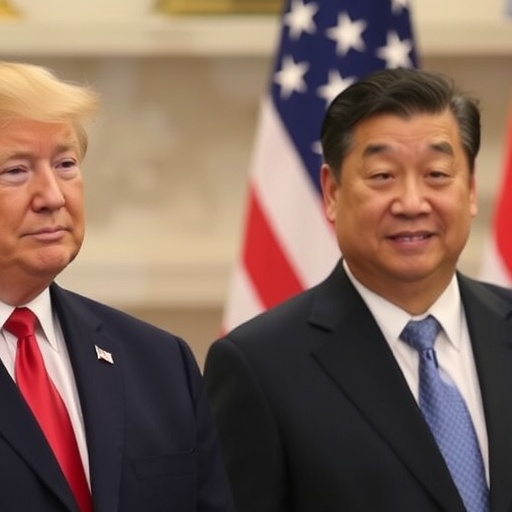Trump to Urge Xi Jinping for Jimmy Lai’s Release at High-Stakes China Summit in South Korea
In a bold move that underscores escalating tensions over human rights in Hong Kong, President Donald Trump has vowed to directly confront Chinese President Xi Jinping about the release of imprisoned media tycoon Jimmy Lai during their pivotal meeting at an Asia summit in South Korea this Thursday. The announcement comes amid mounting pressure from over 30 U.S. lawmakers, who have highlighted Lai’s rapidly deteriorating health after more than three years in detention, turning what was anticipated as a routine diplomatic gathering into a flashpoint for U.S.-China relations.
Jimmy Lai, the 76-year-old founder of the now-defunct Apple Daily newspaper, has become a symbol of resistance against Beijing’s crackdown on press freedom and democracy in Hong Kong. His case has drawn international scrutiny, with advocates arguing that his charges under China’s national security law are politically motivated. Trump‘s decision to elevate Lai’s plight to the top of the agenda at the China summit signals a potential shift in U.S. strategy toward prioritizing human rights in dealings with Xi Jinping, even as trade and security issues loom large.
The White House confirmed Trump’s intentions late Tuesday, with a spokesperson stating, “President Trump will not shy away from discussing the urgent humanitarian concerns surrounding Jimmy Lai’s imprisonment when he meets with President Xi.” This comes on the heels of a bipartisan letter from U.S. Congress members, including prominent figures like Sen. Marco Rubio and Rep. Chris Smith, who urged immediate action citing medical reports of Lai’s declining condition, including diabetes complications and weight loss.
Jimmy Lai’s Defiant Stand Against Beijing’s Grip on Hong Kong
Jimmy Lai’s journey from a rags-to-riches entrepreneur to a jailed dissident encapsulates the turbulent history of Hong Kong under increasing Chinese influence. Born in mainland China in 1948, Lai fled to British Hong Kong as a teenager and built a fashion retail empire before pivoting to media in the 1990s. He launched Next Magazine in 1990 and Apple Daily in 1995, transforming the latter into a fiery pro-democracy tabloid that routinely challenged Beijing’s authority with its bold editorials and investigative reporting.
Apple Daily’s circulation peaked at over 500,000 copies daily, making it one of Hong Kong’s most influential voices during the 2019 pro-democracy protests. Lai’s outlets were unapologetic in their criticism of Xi Jinping’s government, accusing it of eroding the ‘one country, two systems’ framework promised when Hong Kong was handed over to China in 1997. In response, Beijing imposed the National Security Law in June 2020, which criminalized acts deemed as secession, subversion, or collusion with foreign forces—broad provisions that critics say are tools for silencing dissent.
Lai was arrested on August 10, 2020, accused of colluding with foreign forces and fraud. He has been held in solitary confinement at Stanley Prison, enduring what human rights groups describe as harsh conditions. By 2023, Lai faced multiple trials; in one, he was convicted of seditious publication and sentenced to nearly six years, though he remains in pre-trial detention for the more serious national security charges, which could carry a life sentence. Supporters, including Amnesty International, have called his detention a ‘travesty of justice,’ pointing to the lack of jury trials and the use of closed-door proceedings.
Throughout his ordeal, Lai has remained steadfast. In a rare court appearance in 2022, he declared, “I stand for freedom, and I will not bend.” His family, including his son Sebastien Lai, has been vocal internationally, briefing U.S. officials on the prisoner’s plight. Sebastien recently told reporters, “My father’s health is failing, but his spirit is unbroken. The world must act now.” This personal narrative has fueled the urgency behind Trump’s push at the upcoming China summit.
U.S. Lawmakers’ Bipartisan Plea Highlights Lai’s Health Crisis
The appeal to Trump originated from a coalition of over 30 U.S. lawmakers, a rare show of unity across party lines on foreign policy. Led by Republican Sen. Marco Rubio of Florida and Democratic Rep. James McGovern of Massachusetts, the group sent a letter to the White House on Monday, detailing alarming medical assessments of Jimmy Lai’s condition. The document, signed by figures including House Speaker Mike Johnson and Senate Minority Leader Chuck Schumer, emphasized that Lai’s untreated diabetes has led to severe neuropathy, vision impairment, and a 20% weight loss since his incarceration began.
Medical experts consulted by the lawmakers, including a report from the U.S. Commission on International Religious Freedom, warn that without intervention, Lai could face life-threatening complications within months. “Jimmy Lai is not just a journalist; he’s a human being whose rights are being trampled,” Rubio stated in a press release. “President Trump has a unique opportunity at this China summit to demand his release on humanitarian grounds.”
This bipartisan effort reflects broader congressional frustration with China’s human rights record. In 2023 alone, the U.S. House passed the Hong Kong Economic and Trade Office Certification Act, which could close Hong Kong’s economic offices in the U.S. if Beijing’s interference continues. Lai’s case has been cited in at least five legislative hearings this year, with lawmakers invoking the Magnitsky Act to push for sanctions on Hong Kong officials involved in his prosecution.
Statistics underscore the crackdown’s scope: Since the National Security Law’s enactment, over 280 people have been arrested on related charges, including 47 pro-democracy activists in the largest trial of its kind. Apple Daily itself was forced to shut down in 2021 after police seized its assets and arrested its editors. Lai’s supporters argue his release could serve as a litmus test for any progress in U.S.-China dialogue, especially as Trump prepares to meet Xi Jinping amid ongoing trade disputes.
High-Tension Agenda at the South Korea China Summit
The Thursday summit in South Korea, hosted under the auspices of the Asia-Pacific Economic Cooperation (APEC) forum, was originally slated to focus on economic recovery post-pandemic and regional security. However, Trump’s confirmation of raising Jimmy Lai’s case injects a volatile human rights element into discussions with Xi Jinping. The meeting, set against the backdrop of Seoul’s bustling diplomatic scene, will be the first in-person encounter between the two leaders since Trump’s re-election, adding layers of geopolitical intrigue.
Contextually, U.S.-China relations have been strained by issues like Taiwan, the South China Sea, and technology export controls. Trump has historically used personal diplomacy with Xi Jinping to negotiate deals, as seen in the 2018-2020 trade war phase one agreement. Yet, human rights have increasingly factored in; the Biden administration sanctioned Hong Kong officials over Lai’s arrest, and Trump has signaled continuity by criticizing Beijing’s actions in Hong Kong during his campaign.
Analysts predict the China summit could yield side agreements on fentanyl precursors—a Trump priority—but Lai’s release might complicate matters. A senior State Department official, speaking anonymously, noted, “This isn’t just about one man; it’s about signaling to the world that the U.S. won’t ignore Hong Kong’s erosion of freedoms.” Protests are expected outside the summit venue, organized by Hong Kong diaspora groups demanding Lai’s freedom, potentially amplifying global attention.
Xi Jinping’s response remains uncertain. Beijing has dismissed foreign interference in Hong Kong affairs as ‘internal matters,’ with state media portraying Lai as a ‘traitor.’ However, with China’s economy facing slowdowns—GDP growth dipped to 4.7% in Q2 2024—Xi might seek concessions from Trump, possibly opening a window for humanitarian gestures.
Global Echoes and Risks in Pressing for Lai’s Freedom
The push for Jimmy Lai’s release reverberates beyond Washington and Beijing, drawing support from international bodies and allies. The European Union, United Kingdom, and Australia have echoed U.S. calls, with UK Foreign Secretary David Lammy stating last week, “Jimmy Lai’s continued detention is a stain on Hong Kong’s rule of law.” In a joint statement, 15 Commonwealth nations urged Xi Jinping to consider clemency, citing Lai’s age and health.
Human rights organizations have amplified the campaign. Human Rights Watch’s 2024 World Report dedicates a section to Lai, documenting over 1,300 national security law arrests in Hong Kong. Reporters Without Borders ranks China 179th out of 180 for press freedom, with Lai’s case exemplifying the global chill on journalism. Economically, the stakes are high: Hong Kong’s status as a financial hub is waning, with foreign direct investment dropping 8% in 2023, partly due to perceived political risks.
For Trump, raising the issue at the China summit carries risks. A rebuff from Xi Jinping could escalate rhetoric, potentially derailing trade talks valued at $600 billion annually. Yet, success might bolster Trump’s image as a defender of freedoms, appealing to his base and international partners. Experts like Orville Schell of the Asia Society warn, “This confrontation could redefine the summit’s legacy, either fostering dialogue or deepening divides.”
Domestically in Hong Kong, the atmosphere is tense. While public protests have waned under the security law, underground networks continue to support Lai. His legal team, led by British barrister Tim Owen, has appealed to the UN Working Group on Arbitrary Detention, which in 2023 ruled Lai’s imprisonment arbitrary—a finding Beijing ignored.
Potential Outcomes and the Road Ahead for U.S.-China Human Rights Talks
As the South Korea summit approaches, eyes are on whether Trump’s direct appeal to Xi Jinping could lead to Jimmy Lai’s release or at least medical parole. Optimists point to precedents like the 2022 release of Canadian detainees Michael Kovrig and Michael Spavor after U.S. pressure on Huawei’s Meng Wanzhou. Pessimists, however, cite Beijing’s unyielding stance, as seen in the ongoing detention of Uyghur activists and Tibetan leaders.
Post-summit, implications could ripple through policy. A positive outcome might encourage further U.S. legislation, such as expanding the Uyghur Forced Labor Prevention Act to Hong Kong goods. Conversely, inaction could prompt sanctions on more Chinese officials, straining the fragile U.S.-China detente. Lai’s son Sebastien has called for sustained pressure, saying, “One meeting isn’t enough; this must be part of ongoing diplomacy.”
Looking further, the case highlights the evolving role of media moguls in geopolitics. Lai’s story parallels those of other jailed journalists worldwide, from Iran’s Narges Mohammadi to Russia’s Vladimir Kara-Murza. For Hong Kong, his potential freedom could reinvigorate calls for autonomy, though experts doubt it would reverse the national security law’s entrenchment.
Ultimately, Trump’s gambit at the China summit tests the boundaries of personal diplomacy in an era of great power competition. If successful, it could mark a turning point for human rights in U.S.-China relations; if not, it underscores the challenges of confronting Xi Jinping’s vision for a unified, controlled Hong Kong. As Thursday dawns in Seoul, the world watches, hoping for justice for one man’s unyielding pursuit of truth.








